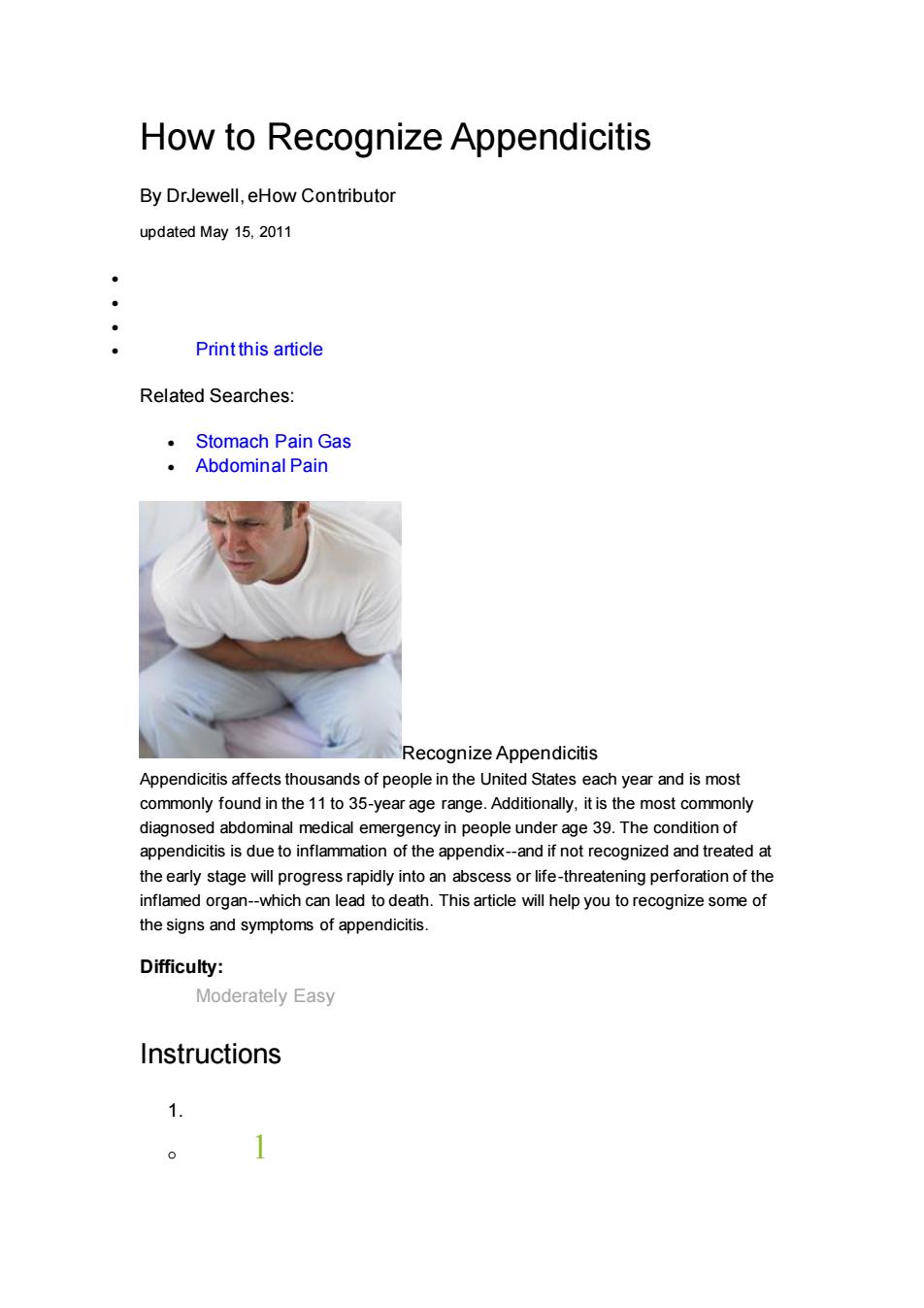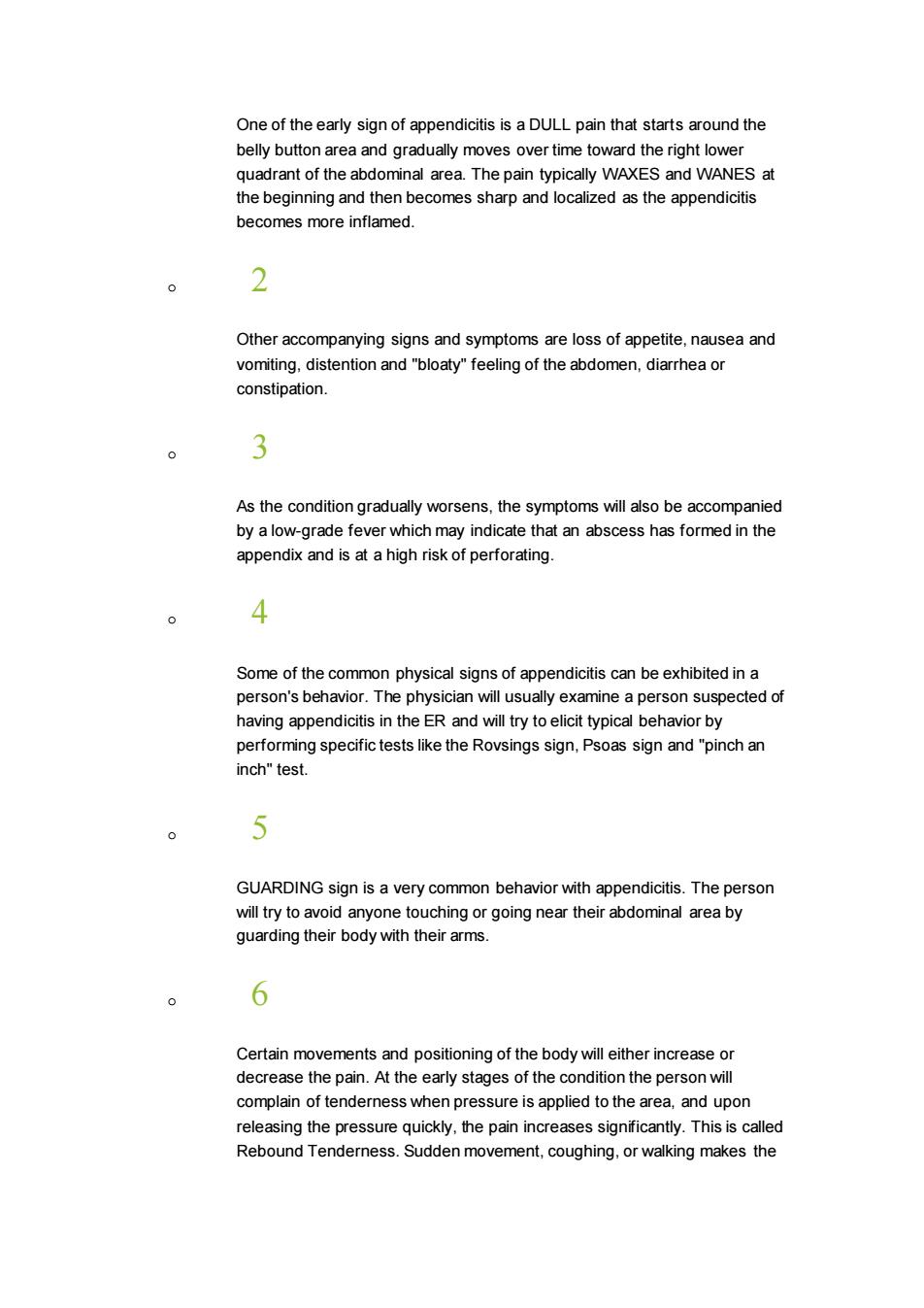
How to Recognize Appendicitis By DrJewell,eHow Contributor updated May 15.2011 Print this article Related Searches: Stomach Pain Gas Abdominal Pain Recognize Appendicitis Appendicitis affects thousands of people in the United States each year and is most commonly found in the 11 to 35-year age range.Additionally,it is the most commonly on of tdue tnof heendo diagnose cy in people under the early stage will progress rapidly into an abscess or life-threatening perforation of the inflamed organ--which can lead to death.This article will help you to recognize some of the signs and symptoms of appendicitis. Difficulty: Moderately Easy Instructions 1. 0
How to Recognize Appendicitis By DrJewell, eHow Contributor updated May 15, 2011 • • • • Print this article Related Searches: • Stomach Pain Gas • Abdominal Pain Recognize Appendicitis Appendicitis affects thousands of people in the United States each year and is most commonly found in the 11 to 35-year age range. Additionally, it is the most commonly diagnosed abdominal medical emergency in people under age 39. The condition of appendicitis is due to inflammation of the appendix--and if not recognized and treated at the early stage will progress rapidly into an abscess or life-threatening perforation of the inflamed organ--which can lead to death. This article will help you to recognize some of the signs and symptoms of appendicitis. Difficulty: Moderately Easy Instructions 1. o 1

One of the early sign of appendicitis is a DULL pain that starts around the belly button area and gradually moves over time toward the right lower quadrant of the abdominal area.The pain typically WA S and WANES at the beginning and then becomes sharp and localized as the appendicitis becomes more inflamed. 2 Other accompanying signs and symptoms are loss of appetite.nausea and vomiting.distention and"bloaty"feeling of the abdomen,diarrhea or constipation. 3 As the condition gradually worsens,the symptoms will also be accompanied by a low-grade fever which may indicate that an abscess has formed in the appendix and is at a high risk of perforating. 4 Some of the common physical signs of appendicitis can be exhibited in a person's behavior.The physician will usually examine a person suspected of having appendicitis in the ER and will try to elicit typical behavior by performing specific tests like the Rovsings sign,Psoas sign and"pinch an inch"test. 5 GUARDING sign is a very common behavior with appendicitis.The person will try to avoid anyone touching or going near their abdominal area by guarding their body with their arms. 6 Certain movements and positioning of the body will either increase or decrease the pain.At the early stages of the condition the person will complain of tenderness when pressure is applied to the area,and upon n increases significantly.This is called Rebound Tenderness.Sudden movement,coughing.or walking makes the
One of the early sign of appendicitis is a DULL pain that starts around the belly button area and gradually moves over time toward the right lower quadrant of the abdominal area. The pain typically WAXES and WANES at the beginning and then becomes sharp and localized as the appendicitis becomes more inflamed. o 2 Other accompanying signs and symptoms are loss of appetite, nausea and vomiting, distention and "bloaty" feeling of the abdomen, diarrhea or constipation. o 3 As the condition gradually worsens, the symptoms will also be accompanied by a low-grade fever which may indicate that an abscess has formed in the appendix and is at a high risk of perforating. o 4 Some of the common physical signs of appendicitis can be exhibited in a person's behavior. The physician will usually examine a person suspected of having appendicitis in the ER and will try to elicit typical behavior by performing specific tests like the Rovsings sign, Psoas sign and "pinch an inch" test. o 5 GUARDING sign is a very common behavior with appendicitis. The person will try to avoid anyone touching or going near their abdominal area by guarding their body with their arms. o 6 Certain movements and positioning of the body will either increase or decrease the pain. At the early stages of the condition the person will complain of tenderness when pressure is applied to the area, and upon releasing the pressure quickly, the pain increases significantly. This is called Rebound Tenderness. Sudden movement, coughing, or walking makes the

pain worse,but lying in a fetal position usually decreases the intensity of the pain. 7 Any time you suspect appendicitis you must seek medical attention because the key is to treat it before the organ ruptures or perforates.The inflamed organ is prone to rupture more quickly in a younger person than in an older person,so it is best to not take abdominal pain lightly,especially if you are younger
pain worse, but lying in a fetal position usually decreases the intensity of the pain. o 7 Any time you suspect appendicitis you must seek medical attention because the key is to treat it before the organ ruptures or perforates. The inflamed organ is prone to rupture more quickly in a younger person than in an older person, so it is best to not take abdominal pain lightly, especially if you are younger